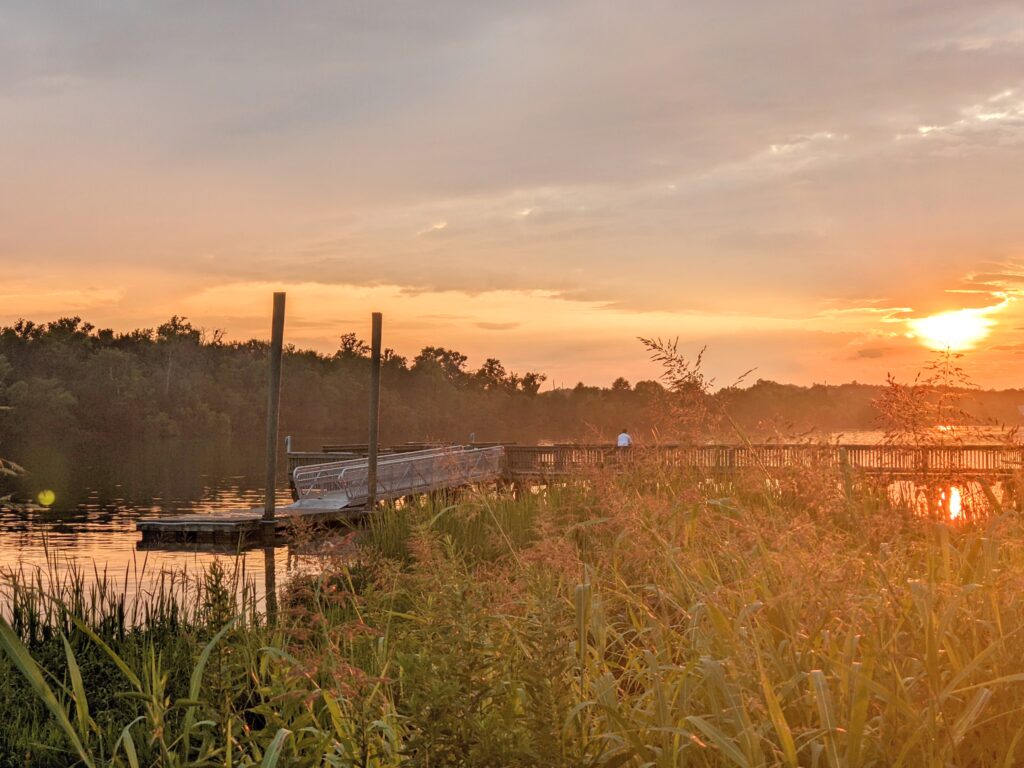RECAP: Clean Water & Flood Resilience Policy from the 2024 General Assembly Session

Of the 182 bills that Virginia Conservation Network took a position on this session, 35 bills addressed water and flood resilience policy for the Commonwealth. Our Partners advocated for policies that:
- Protect Virginians from flooding
- Prohibit the use of toxic materials leaking into our water
- Reduce plastic litter
- Protect the health of our streams, rivers, and the Bay
See the wins and missed opportunities for land & wildlife conservation policy below. You can see the outcomes of all of VCN’s policy positions on our Bill Tracker.
Policy Wins for Clean Water & Flood Resilience

Photo by Dan Motta
Flood Resilient Communities
Vegetated buffers for flooding continue to disappear and climate change impacts escalate sea level rise, rainfall intensity, and flood occurrences across the state. The first step to address statewide flood disasters is to fully leverage funding to implement flood resilience projects. Virginia passed bills this session that expand the capacity of existing flood funds and programs by:
- Enabling the Resilient Revolving Loan Fund to distribute grants and loans to low-income communities [HB673]
- Establishing and supporting an Office of Commonwealth Resilience with a standalone Chief Resilience Officer that will oversee the distribution of key resilience funds [HB1458]
However, the General Assembly left bills on the table that could have further improved Virginia’s protections from flooding. The conservation community will continue to advocate for policies that require flood risk disclosures for homebuyers and renters, establish a workgroup for wetland protection and restoration, and make Dam Safety Funds more accessible to private landowners in future years. You can learn more about passed and defeated bills that support statewide flood planning from this past General Assembly session in our Bill of the Day post.
CLEANING UP OUR RIVERS & the CHESAPEAKE BAY
The health of Virginia’s streams, rivers, and the Bay reflects the quality of our drinking water. Virginia’s waterways are degraded by excessive pollutants that eventually make their way into our water. The General Assembly passed bills that will improve the data and decision-making process when it comes to monitoring our water usage by:
- Creating a study to recommend improvements to the Groundwater Management Act, which has not been updated since it passed in 1992 [SJ25]
- Authorizing the VA DEQ to utilize comprehensive data when issuing or renewing water withdrawal permits to make sure the DEQ has access to all relevant water withdrawal data including water levels, flow rates, and quality [SB581]
Even more pressing are the toxic pollutants that are found at dangerous levels in public water supplies that often violate water quality standards. Virginia passed bills this session that will monitor, identify, and reduce the amount of toxic waste that is poisoning our water by:
- Banning the use of toxic pavement sealants containing toxic PAHs [HB985]
- Requiring monitoring of toxic PFAS levels in wastewater [HB1085/SB243]
- Prohibiting the use of toxic cyanide during mining operations to protect drinking water from contamination [HB85]
- Regulating the reporting of hazardous substance discharges from above-ground storage tanks [HB949]
Addressing water pollution and restoring Virginia’s streams, rivers, and the Bay has been a decades-long effort that doesn’t stop here. Not all of our supported water protection bills passed this session, but the progress made in this session is very promising for the health of our water.
Addressing Plastic Waste
Virginia’s plastic waste crisis threatens every part of our lives by contaminating the air we breathe, our farming soils, and our drinking water. Plastic waste and its byproducts have been linked to cancer, infertility, and other serious health impacts, yet they remain largely unregulated in the Commonwealth. Despite many opportunities to identify and reduce the major sources of plastic waste, all bills aiming to reduce plastic waste were defeated. Some of the missed opportunities included studying the amount of microplastics in Virginia drinking water, developing a market for recycled goods, prohibiting the use of recycling symbols on products that are not actually recyclable, and compiling a list of recyclable materials in the Commonwealth.
However, legislators included a budget item that moves the delayed ban on styrofoam take-out containers from 2028 to 2025 for large retail establishments, and from 2028 to 2026 for smaller establishments [362 #1c]. This would restore the timeline for a bill our Partners passed in a previous General Assembly session.
More attempts to address plastic waste will be taken up in the next General Assembly session. Learn more about Virginia’s plastic waste crisis and see all considered bills from this session on our Bill of the Day post.

Photo by Sue Mangan
Missed Opportunities for Clean Water & Flood Resiliency
Menhaden Misstep
As reported by the Chesapeake Bay Foundation, the General Assembly took a “Menhaden Misstep” by punting a bill to study “the most important fish in the sea.” Atlantic menhaden are a vital food source that supports much of the aquatic life in the Chesapeake Bay and the economic activity from the Bay, but their population has dropped dramatically over the last 20 years. We will see this bill again next year and will continue educating lawmakers about the big importance of this little fish until then.
MORE POLICY UPDATES FROM THE GENERAL ASSEMBLY

Passed policy now heads to the Governor’s desk for him to sign, amend, or veto bills by April 8th. Legislators will make a final vote on amended bills during Veto Session on April 17th to determine which bills will officially become law starting on July 1st, 2024.
Be the first to know about new environmental legislation: register for our virtual General Assembly Recap on Tuesday, April 23rd, from 12-1:30 PM. You’ll hear the inside scoop from environmental policy experts about the conservation community’s biggest victories, the missed opportunities, and any surprise outcomes from the 2024 General Assembly session.
See the outcomes of other environmental policies from the 2024 General Assembly session below:






